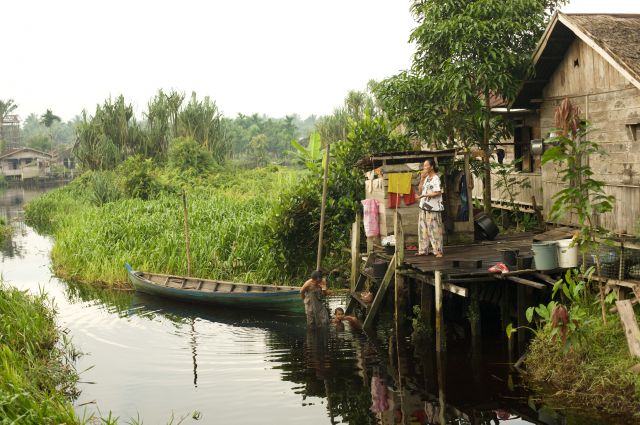Open Government Partnership Global Summit: An Opportunity for Strengthening Land Rights
The Open Government Partnership (OGP) Global Summit in Mexico City this week brings together more than 1,500 participants, including ministers, from around the world. While OGP member governments have made notable progress toward transparencyAccording to OGP’s Articles of Governance, transparency occurs when “government-held information (including on activities and decisions) is open, comprehensive, timely, freely available to the pub... More and accountability through the four-year-old partnership, there has been little attention given to making land holdings and land transactions transparent.
This must change if governments are to sufficiently protect human rightsAn essential part of open government includes protecting the sacred freedoms and rights of all citizens, including the most vulnerable groups, and holding those who violate human rights accountable. T..., foster sustainable development and support good governance. The Global Summit provides a unique and important opportunity for partner governments to make new, concrete commitments on land transparency and accountability or include related actions in their National Action Plans.
Desun Gembira village in Sumatra, Indonesia. Photo by Rainforest Action Network/Flickr.
You Can’t Secure Human Rights without Land Rights
Land and natural resources lie at the heart of social, political and economic life in much of rural Africa, Latin America and Asia. For Indigenous Peoples and rural communities, they represent fundamental assets—primary sources of livelihood, nutrition, income, wealth and employment—and are a basis for security, status, social identity and political relations. Land and resources also have historical, cultural and spiritual significance for many rural men and women.
But in many countries, governments are not open, transparent or accountable in land matters. Some governments do not make public maps of the lands collectively held and used by Indigenous Peoples and rural communities, making them essentially invisible and vulnerable to expropriation. Other governments acquire and then, behind closed doors, allocate large plots of land to domestic and foreign investors. Sometimes referred to as “land grabbing,” the acquisition of indigenous and community land can have profound adverse effects on social and economic wellbeing. When communities lose their land or when governments significantly restrict how communities can use their land, they often lose their livelihoods and fall into poverty.
An International Focus on Land Rights
While not a new issue, land transparency has in recent years received considerably more attention from some governments, civil society organizations, development assistance agencies and others, including through:
- New International Standards: In May 2012, the Committee on World Food Security officially endorsed the Voluntary Guidelines on the Responsible Governance of Tenure of Land, Fisheries and Forests in the Context of National Food Security (VGs). The VGs promote secure tenure rights and equitable access to land and natural resources, and point to the importance of transparency as a means of eradicating hunger and poverty, supporting sustainable development and enhancing the environment. They have become the new international standards on land rights, with implementation encouraged by G20, Rio+ 20, United Nations General Assembly and other international fora.
- New Land Transparency Initiatives: Encouraged by the success of the Extractive Industry Transparency Initiative (EITI), Open Contract Partnership and other initiatives, new efforts have been launched on land transparency. Openland Contracts is an online repository of publicly available contracts for large-scale land, agriculture and forestry projects. The Global Call to Action is a collaborative effort of many civil society organizations to provide greater visibility, advocacy tools and support to Indigenous Peoples and communities to secure rights to their land and natural resources. The Land Matrix, a land monitoring initiative, has helped shine the light on large-scale land investments. And next month, LandMark, the first online global platform with maps and other information on indigenous and community land will be launched.
Ways the OGP Global Summit Can Make Progress
This new attention on land transparency is welcome news for all parties concerned with poverty reduction, sustainable development, and transparent and accountable government. The OGP Global Summit provides an opportunity for members to consolidate and build momentum, reflect on what is working and what is not, and lay out a framework for further exchange, cooperation and action. Governments should capitalize on the momentum, and make strong commitments or develop National Action Plans that promote transparency and accountability in land matters. Civil society organizations can help by pressing governments to address land transparency by:
- Creating a publicly available cadaster, which includes not just the boundaries of individual private property, but also land held by Indigenous Peoples and other rural communities that is registered and held under customary tenure arrangements;
- Sharing information regarding ongoing negotiations for agricultural or land-based investments; and
- Releasing to the public the contracts and agreements with foreign and domestic investors.
This year, the OGP Global Summit will pay special attention to the role open government can play in the implementation of the just released Sustainable Development Goals (SDGs) of the Post-2015 Development Agenda. Several SDGs Targets address access to information/transparency (Targets 12.8, 16.6 and 16.10) and land rights/tenure (Targets 1.4, 2.3 and 5a). OGP commitments to land transparency that complement and support SDGs will help ensure coordinated action across the globe, allow for easier and accurate tracking of the SDGs, and enable independent monitoring and verification of national progress.
The eyes of the world will be on the OGP Global Summit this week. Governments must not miss the opportunity to make bold commitments to land transparency.
This article was originally published on the WRI website: http://www.wri.org/blog/2015/10/open-government-partnership-global-summit-opportunity-strengthening-land-rights

